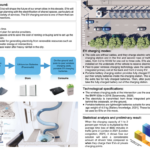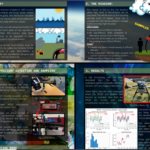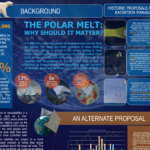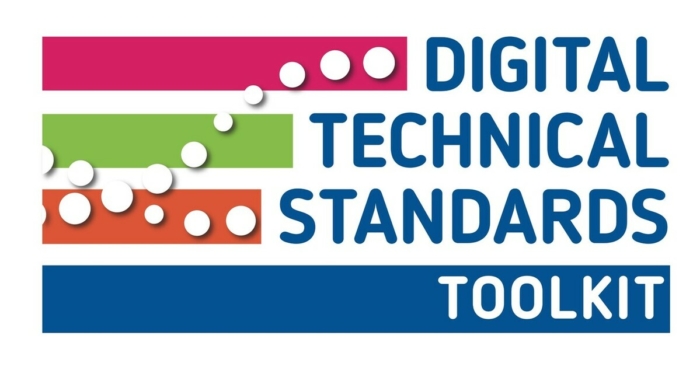The Hammermen Awards an annual prize, presented in association with the Hammermen of Glasgow, to celebrate engineering students’ excellence. And this year you get to decide who wins.
This year’s award has received an unprecedented number of submissions and a team of experts from our hosts at UWE, Bristol longlisted 15 individuals and selected just five finalists who presented their posters during Congress.
Below you can view each finalist’s poster and see all of those which were longlisted as well.
Finalist posters
Click on the thumbnails below to view the posters.
Longlisted posters
Chuka Anthony Okeke, Cardiff University
Forecasting and control of energy use in the building sector has so many approaches adopted by various researchers to provide efficient energy management schedules for various applications. This tends to look at the efficiency of the Artificial Intelligence (AI) technologies, with regards to energy consumption and optimization in buildings. Here, my work borders on the review of different AI technologies with regards to their ease of use and difficulty in training and overall response time. This aids in better understanding of their various adaptability and routes of achieving energy use efficiency thereby reducing waste and improving sustainability of scarce resources.
Holly Elizabeth Au, University of Nottingham
Uncontrolled use of steel and concrete in engineering is causing a depletion in resources, meaning that innovative ways to produce structural members are highly sought after. A new method of using demolished concrete lumps (DCLs) and fresh concrete (FC) has been proposed in the past six years.
DCLs and FC are put into steel tubes. There is lateral confinement. The column ends are strengthened to prevent elephant foot failure, and the columns are then subjected to axial compression. Failure modes are looked at, and ultimate strengths are compared to the current Eurocode 4 predictions.
This is an ongoing MEng project.
This research provides an innovative solution to the issue of discarded plastic face masks by recycling polypropylene, the primary plastic found in the facemasks to manufacture eco-composite by reinforcing it with natural flax fibers, bringing together the three pillars of sustainability through an engineering perspective. Flax fibers were chosen as the most suitable natural fiber for polypropylene reinforcement due to their favorable mechanical properties. The mechanical properties of the FlaxPP material were analysed using software simulations and mathematical calculations. Currently, physical manufacturing of samples of the FlaxPP material is being carried out for specifically investigating the interesting vibration damping properties.
Nur Habibah Binti Saidi, University of Strathclyde
This poster depicts the ethical dimensions of environmental sustainability, as well as some philosophical issues. The current ethical issue is the recovery or regeneration of nature as an environment rather than a mere object. Such a view of nature implies the concept of sustainability as a positive societal value. When it comes to nature as an environment, nature becomes man’s natural habitat and is always supportive of human existence. Environmental ethics is concerned with the issue of responsible personal behaviour in relation to natural resource sustainability.
Rebekah Hinton, University of Strathclyde
Using wastewater accumulating around rural waterpoints to irrigate community gardens, borehole-garden permaculture presents a method of sustainable water management. The technique also presents public health benefits through removing stagnant water around boreholes that can be breeding grounds of disease. By analysing a dataset of over 100,000 cases, this research examines the awareness and adoption of borehole-garden permaculture across Malawi. Generalised linear models identified significant variables influencing awareness and uptake. This work not only guides policy makers in promoting borehole-garden permaculture but informs the promotion of local, community-managed sustainable practises, this will be critical in both climate change adaptation and mitigation.
Lily Jupp, University of Leeds
Traditional agricultural practices are unsustainable, putting pressure on the industry to meet the United Nations sustainability goals ‘Responsible Consumption and Production’ and ‘Zero Hunger’. This inspired the design of a novel, renewables-powered, vertical farm, ‘SkyFarm’; including a circular waste system, sustainably sourced supply chain and pesticide-free environment. SkyFarm’s design enables crop growth with a greater yield than traditional farming despite consuming 95% less water, and its small footprint allows it to be in urban areas reducing product transport emissions. SkyFarm can ethically and sustainably provide customers with a balanced diet and reduce pressure on traditional farms, allowing for ecosystem recovery.
Georgia Madden, Oxford Brookes University
The aim of this poster is to highlight the environmental benefits of electrification by using batteries within vehicles which were traditionally powered by engines. The poster will use industrial insight and expertise to discuss different vehicle programs using electrification such as automotive, motorsport, helicopters and public transport. The poster will also highlight the sustainability benefits of this move towards electrification.
Jennifer Ward George, University of Cambridge
Humanitarian shelter responses have impact on health, livelihoods, economic stimulation, education, food and nutrition, and in reducing vulnerability. They are central to the recovery of communities in post-crisis situations. However, the shelter sector also operates between conflicting priorities of government-donors and affected populations, a concentration on products over processes, and short-term response inadequate for long-term needs. Entrenched power structures in the shelter sector are inhibiting successful, people-centric approaches in decision-making. To overcome this, sheltering needs to be re-defined as an enabled process to facilitate a living environment for crisis-affected communities and individuals to meet their current and future needs.









